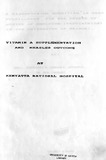| dc.contributor.author | Ogaro, Francis O | |
| dc.date.accessioned | 2013-05-23T09:23:20Z | |
| dc.date.available | 2013-05-23T09:23:20Z | |
| dc.date.issued | 1990 | |
| dc.identifier.citation | Master Of Medicine (Paediatrics) | en |
| dc.identifier.uri | http://erepository.uonbi.ac.ke:8080/xmlui/handle/11295/24761 | |
| dc.description.abstract | A double blind controlled clinical trial, on the effect of Vitamin A supplementation on the immediate outcome of measles, was carried out at the infectious disease Hospital (IDH), of
Kenyatta National Hospital (KNH) Nairobi, Kenya. A total of 294 children admitted with measles (146 treatment and 148 controls) were randomly allocated into the treatment and control groups. A single oral dose of Vitamin A or Placebo was given at admission. There was comparability between the two groups in age and sex distribution, nutritional status, vaccination status against measles, residence in Nairobi, du.ation of measles illness before admission, serum retinol level and in prevalence of malarial parasitaemia:
39.8% of the children were malnourished and 33% were below
the age recommended for vaccination against measles in Kenya.
48.1% of the children had serum retinol level less than 20.0~g/dl. The most prevalent c~mplications were L.T.B., diarrhoea,
pneumonia and otitis media.
Vitamin A supplementation significantly reduced the severity of diarrhoea and L.T.B. as well as the incidence of otitis media P < 0.05. Vitamin A supplemented children had a better weight gain at one month after discharge. The overall mortality was
2.7%. | en |
| dc.language.iso | en | en |
| dc.publisher | University Of Nairobi | en |
| dc.title | Vitamin A Supplementation And Measles Outcome At, Kenyatta National Hospital | en |
| dc.type | Thesis | en |
| dc.description.department | a
Department of Psychiatry, University of Nairobi, ; bDepartment of Mental Health, School of Medicine,
Moi University, Eldoret, Kenya | |
| local.publisher | College of Health Sciences | en |

